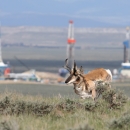States
Alabama, Alaska, Arizona, Arkansas, California, Colorado, Connecticut, Delaware, Florida, Georgia, Hawaii, Idaho, Illinois, Indiana, Iowa, Kansas, Kentucky, Louisiana, Maine, Maryland, Massachusetts, Michigan, Minnesota, Mississippi, Missouri, Montana, Nebraska, Nevada, New Hampshire, New Jersey, New Mexico, New York, North Carolina, North Dakota, Ohio, Oklahoma, Oregon, Pennsylvania, Rhode Island, South Carolina, South Dakota, Tennessee, Texas, Utah, Vermont, Virginia, Washington, West Virginia, Wisconsin, WyomingFederal and state policies on global climate change climate change
Climate change includes both global warming driven by human-induced emissions of greenhouse gases and the resulting large-scale shifts in weather patterns. Though there have been previous periods of climatic change, since the mid-20th century humans have had an unprecedented impact on Earth's climate system and caused change on a global scale.
Learn more about climate change , economic recovery, and national energy security drive the development of a variety of domestic energy sources. Energy resource development is increasing, including traditional energy sources such as oil, gas and coal, and renewable sources such as wind, solar and geothermal. Energy development is necessary to meet the needs of the American public, but there often are environmental impacts. The U.S. Fish and Wildlife Service (Service) helps energy developers avoid and minimize those impacts.
The Service works with others to conserve, protect, and enhance fish, wildlife, and plants and their habitats for the continuing benefit of the American people. The Service provides developers, landowners, other federal agencies, states, and tribal entities with information and guidance regarding wildlife issues and federal laws and regulations. Our energy-related work ranges in scale from assistance for individual projects to coordinating with partners to plan across landscapes. The initial contact is usually with Ecological Services Program field offices, but coordination of any required permits or access agreements for projects on Service lands may be with the appropriate Service management office (e.g., national wildlife refuges, fish hatcheries, or administrative lands).
Learn more about the Service's role in reviewing energy development projects.
Learn more about the laws and policies in place to protect plants and animals affected by energy production.




